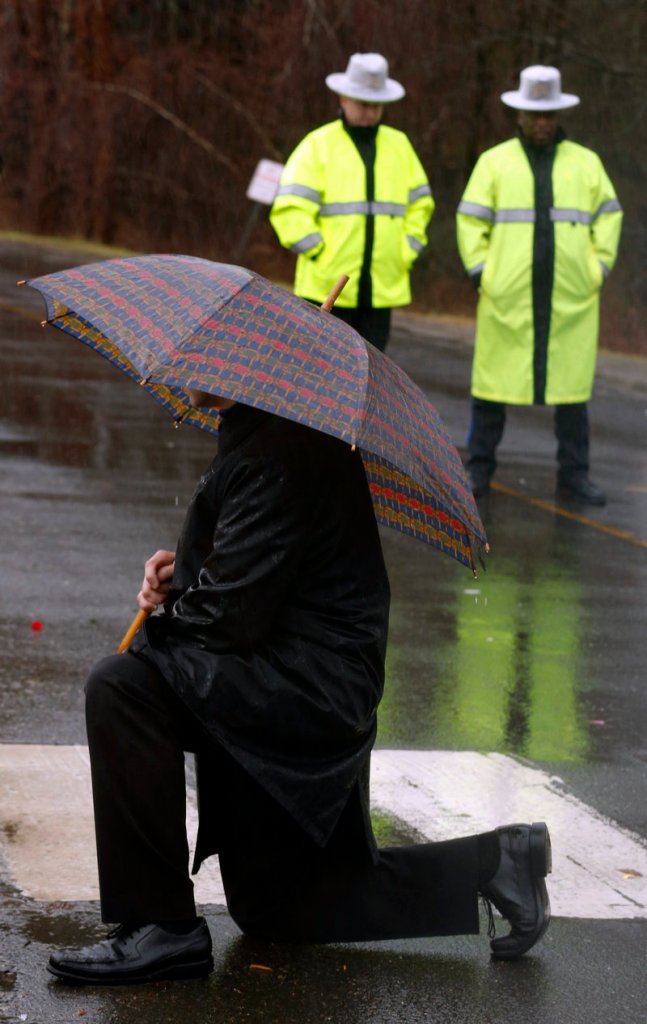On Dec. 12, just two days before the tragic deaths at Sandy Hook Elementary School, the Maine Medical Association’s public health committee was debating the wording of a resolution aimed at strengthening the association’s position on limiting the use of firearms.
The discussion swirled around two issues: what kinds of guns should be available to most citizens and how to prevent the use of lethal weapons by citizens with psychiatric problems. These two issues are, of course, the very same issues the nation is now struggling to address.
There is no doubt that the use of guns is a major public health problem. There are more than 30,000 deaths from firearms each year in our country, nearly as many as those from car crashes.
There has been much hue and cry this year about West Nile virus, which caused around 230 deaths. If a bullet were considered as much a pathogen as a virus, imagine the efforts to eradicate the disease. In this case, as in all cases, prevention must address both the “virus” (guns and bullets) and the “vector” (the shooter).
Finger pointing that this violence is all due to mental illness is not helpful. People with mental illness are much more likely to be victims of violence than to be perpetrators of it.
We know that men wielding guns are responsible for most of the violence in the United States: robberies, gang violence, workplace killings. Just as most men are not violent, neither are the majority of people with mental illness. How do we protect society from the minority who are?
• First and foremost, we need to control the availability of high-capacity, rapid-fire weapons and magazines. It doesn’t matter the shooter’s motivation: terrorism, psychotic delusions or revenge after being jilted. Decreasing the bullet capacity of the weapon means that fewer people can be gunned down in seconds.
• Second: Improve the system for background checks and close loopholes for gun purchases or ownership. Gun laws in this country are too easy to get around. You may be subject to a background check at a gun show, but not if you buy a gun from a private seller.
We also need to decide as a society who is too dangerous to be trusted with a deadly weapon. In Maine, we already restrict anyone who has been civilly committed to inpatient psychiatric treatment from owning a gun. But it’s not clear how the state manages that information or if it gets entered into background check databases.
Improved outpatient civil commitment processes and flow of patient referrals to mental health treatment from schools or after police interaction may also increase public health and safety. Which leads to our next recommendation:
• Improve access to treatment. We need to focus on identification, support and treatment of troubled youth who may be falling through the cracks of available resources. Young adults with the most severe psychiatric diagnoses do end up in treatment (or jail), but the kids who are just squeaking by are the ones we should be paying attention to.
The young men who perpetrated the mass killings in Aurora, Columbine and Newtown were not hardened criminals, nor easily recognized psychopaths. They have been quiet, odd fellows living marginally alongside the rest of us, ignored at best, bullied and rejected at worst. Most had not received psychiatric treatment or were no longer in treatment.
Many physicians and psychologists say that the prevalent images of violence on television and in movies and video games anesthetize us to the consequences of gun violence, glorify the shooter and dehumanize the victims. We can imagine the perfect storm leading to mass shootings: young men in early adulthood, steeped in the violence of the media, who see themselves as being disrespected or left behind. Some final insult leads to an archetypal, cinematic response.
Just as it takes a village to raise a child, it will take our whole nation acting responsibly to end the contagion of violence. Parents need to supervise their children’s media intake to a higher degree. We need to vote with our feet when it comes to violent films, TV and video games. And we need to support our legislators as they move to make laws governing this crucial public health need.
Dieter Kreckel, M.D., a family physician practicing in Rumford, is president of the Maine Medical Association, and Jeff Barkin, M.D., D.A.F.P.A., a psychiatrist practicing in Portland, is president of the Maine Association of Psychiatric Physicians.
Send questions/comments to the editors.



Success. Please wait for the page to reload. If the page does not reload within 5 seconds, please refresh the page.
Enter your email and password to access comments.
Hi, to comment on stories you must . This profile is in addition to your subscription and website login.
Already have a commenting profile? .
Invalid username/password.
Please check your email to confirm and complete your registration.
Only subscribers are eligible to post comments. Please subscribe or login first for digital access. Here’s why.
Use the form below to reset your password. When you've submitted your account email, we will send an email with a reset code.